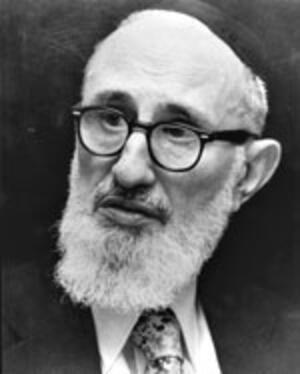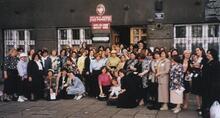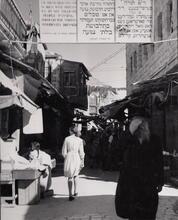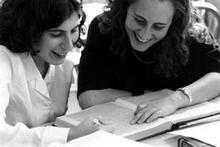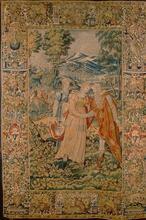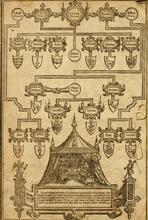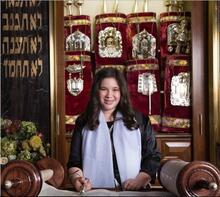Soloveitchik, Rabbi Joseph Dov
Joseph Dov Soloveitchik
Courtesy of Yeshiva University.
Joseph Dov Soloveitchik shaped Jewish practice and public opinion through the era of second-wave feminism. In 1923 he created the Maimonides School in Boston, which, in an unprecedented fashion, educated both boys and girls in religious and secular subjects. In 1941 he became rosh yeshiva of Yeshiva University, continuing his practice of blending the best of religious and secular education and training two generations of rabbis. Despite his sometimes progressive actions, he maintained that women and men had separate religious and familial roles. He was against mixed seating in synagogues and speculated that Jewish feminists wanted to participate in services out of political motives, not real religious feeling. These positions from the leader of the Modern Orthodox community cemented resistance to Orthodox feminists’ demands to increase their participation in Jewish rituals.
Rabbi Joseph Dov Soloveitchik was the undisputed rabbinic leader and leading ideologue of American Modern Orthodoxy for much of the twentieth century. Known reverentially as “the Rav” (The Teacher), Soloveitchik, as rosh yeshiva of Yeshiva University from 1941 to 1985, trained scores of American Orthodox rabbis. During this period, he also served as the chief Halachic decisorposek (legal decisor) of Modern Orthodoxy in America and one of its chief architects in shaping communal policy. His impact also resulted from his theological works, in particular The legal corpus of Jewish laws and observances as prescribed in the Torah and interpreted by rabbinic authorities, beginning with those of the Mishnah and Talmud.Halakhic Man (Hebrew; 1944) and Lonely Man of Faith (1965). Employing a wide range of philosophic sources, these works present a sophisticated religious anthropology, which grapples boldly with the major theological challenges facing revealed religion in the modern world.
Soloveitchik’s theological reflections, as well as his life, thereby served as a model for the fledgling Modern Orthodoxy community in post-World War II America. At present, Soloveitchik’s influence is so extensive that many of the current disputes in American Modern Orthodoxy take the shape of divergent interpretations of Soloveitchik’s teachings and actions.
Beliefs about Women and Judaism
As legal decisor and policy maker for Modern Orthodoxy, Rabbi Soloveitchik grappled with women’s issues primarily in two realms: ritual and education. His tendency in the area of ritual change was conservative; he generally opposed efforts to reform rituals to create more equality between men and women. He vociferously opposed the feminist initiatives of the Conservative and Reform movements in this regard. In particular, he denounced the family pews in Conservative and Reform synagogues and upheld the Orthodox practice of segregating men and women in public prayer. He declared that a synagogue with mixed seating “forfeits its sanctity” and is part of “the trend of Christianization of the synagogue” (The Sanctity of the Synagogue, 110).
Soloveitchik also opposed certain efforts of the liberal wing of Modern Orthodoxy regarding religious reform. He opposed women’s prayer services, although he believed that within certain parameters they were permissible on strictly legal grounds. He felt that certain women who participate in these services were impelled by a feminist social agenda rather than purely religious motivation. He was also concerned that women were opting out of public prayer and the rituals associated with it.
Beliefs about Education
In the area of women’s education Soloveitchik’s views were far more liberal and can be considered transformative in view of their impact on the development of Orthodoxy. His involvement in women’s education began shortly after he immigrated from Europe to the Boston area in 1932, together with his wife, Dr. Tonya Soloveitchik. There he played a pivotal role in the founding in 1937 of the Moses ben Maimon (Rambam), b. Spain, 1138Maimonides School, an Orthodox elementary and high school.
With Soloveitchik’s support, the school introduced two important policies regarding education of girls. First, it instituted a coeducational format for all the grades. Coeducation was in concert with current educational trends in America but was relatively innovative in Orthodox educational institutions. Secondly, the school launched a curriculum that did not distinguish between the program of study for boys and girls, even regarding Lit. "teaching," "study," or "learning." A compilation of the commentary and discussions of the amora'im on the Mishnah. When not specified, "Talmud" refers to the Babylonian Talmud.Talmud study. Boys and girls studied Talmud from the seventh to the twelfth grade in coeducational classes. They studied not only practical aspects of Talmud and Jewish law, but also their conceptual underpinnings. Soloveitchik’s advocacy for women’s study of Talmud continued in his role as rosh yeshiva of Yeshiva University; he helped institute a program of Talmud study in Yeshiva University’s Stern College for Women and delivered its inaugural lecture in 1972.
Soloveitchik’s approach to women’s Talmud study contrasts with the traditional approach of Orthodox scholars who generally opposed teaching women Talmud, particularly conceptual analysis of the Talmud. In addition, Soloveitchik’s ruling also defied the contemporary practice in Orthodox educational institutions in America. Even coeducational Orthodox schools, such as Yeshiva of Flatbush and Ramaz School in New York, barred women from Talmud study. The support for women’s Talmud study by a scholar of Soloveitchik’s rank provided an important precedent and was instrumental in bringing about a revolution with respect to women’s Talmud study in the Modern Orthodox community.
Surprisingly, Soloveitchik never provided a rationale for his egalitarian view on women’s education. As Seth Farber, who has chronicled Soloveitchik’s involvement in Maimonides School, concludes, “Rabbi Soloveitchik left no written testimony that would explain the ideology behind these decisions [regarding women’s education], nor did he speak publicly about these matters” (Farber, An American Orthodox Dreamer, 75). What is more, Soloveitchik’s theological work defends a counterview that emphasizes essential gender differences and sharply distinguishes between the role of men and women in Jewish education.
Family Redeemed
Soloveitchik’s most detailed statement regarding women’s status in Judaism and gender difference appears in his posthumously published collection of articles, Family Redeemed (2000). In his treatment of gender, Soloveitchik employs essentialist assumptions, grounding the difference between the male and female personality in a natural and immutable metaphysical distinction:
Sexual differentiation expresses more than a physical property; it manifests an ontic contrast, a dual aspect within the essence of creation, something deeper and more fundamental than natural sexual differentiation that find its full expression in two bi-existential experiences, in two ideas of personalism (Family Redeemed, 70).
Soloveitchik only hints at the nature of this “ontic contrast.” Drawing from his masterful typological depiction of the two dimensions of the human persona in Lonely Man of Faith, Soloveitchik intimates that the male personality is more prone to the autonomous quest for intimate power and the control of nature while the female personality is more of an emotive type who seeks redemption rather than power.
Soloveitchik insists that this essentialist distinction is not sexist, citing the fact that the divine image is granted to men and women alike. He does argue that this metaphysical distinction leads to diverging economic obligations for the husband and wife in the family and contrasting roles regarding the education of their children. With respect to the economic roles of the husband and wife, Soloveitchik avers: “The husband, according to the law, is the provider and the wife is the housekeeper. The husband must support and sustain the wife and she in turn is supposed to the run the household” (Family Redeemed, 53). What is more, Soloveitchik attributes the high rate of divorce in modern society to the inability of the partners to fulfill their respective assigned tasks, which compromises the economic community that should be forged by the marriage.
Soloveitchik also applies his essentialist views to the roles of the parents in educating their children. He argues that the Jewish tradition can be internalized only if it is transmitted through two distinct channels. On the one hand, the tradition must be treated as an intellectual discipline and taught accordingly. On the other hand, Judaism is an experiential tradition that must be communicated through experiential events. Soloveitchik delegates the cognitive educative role to the father and the experiential educative role to the mother. The father must teach Judaism in a strictly intellectual manner, while the mother must transmit the tradition in an emotive and mimetic fashion (Family Redeemed, 114–115).
Overview of Beliefs
Soloveitchik is cognizant that Judaism at times demands sacrifices from women, wives and mothers that are not required of men, husbands and fathers. He points to the traditional portrayal of God as the “God of Abraham, God of Isaac, God of Jacob” rather than the “God of Sarah, God of Rebecca, God of Rachel and Leah.” He also notes that Abraham, the covenantal father, receives acclaim for his accomplishments, while the weighty contribution of Sarah, the covenantal mother, is often overlooked due to her distancing herself from the public eye. Soloveitchik views these imbalances as part of the tragic existence of the Jewish women. However, for Soloveitchik religious life in general is rife with tragic elements and it is these sacrifices which allow for redemptive existence.
In summary, Soloveitchik’s theological works typically display far greater creativity, independence and daring than his decision-making in the areas of Jewish law and communal policy (a pattern that is prevalent among Orthodox scholars who act both as theologians and halakhic scholars). In his writings, Soloveitchik often boldly confronted theological challenges facing Orthodoxy, particularly the proper balance between autonomy and submission in Judaism. In contrast, Soloveitchik at times hesitates to draw the practical conclusion from his theoretical positions. Yet Soloveitchik’s grappling with feminism follows the opposite pattern: his ruling and leadership were critical in Orthodox women’s struggle for a more egalitarian framework for Jewish education, but his writings defend traditional views regarding women as housekeepers and a conception of Jewish education whereby women have little involvement in the transmission of the intellectual aspects of the tradition.
Selected Works by Joseph Soloveitchik
Soloveitchik, Joseph B. Family Redeemed: Essays on Family Relationships. New York: 2000.
Soloveitchik, Joseph. Lonely Man of Faith. New York: 1992 [First appeared in Tradition 7 (1965)].
Farber, Seth. An American Orthodox Dreamer: Rabbi Joseph B. Soloveitchik and the Boston Maimonides School, Hanover: 2004.
Frimer, Aryeh A., and Dov I. Frimer. “Women’s Prayer Services—Theory and Practice.” Tradition 32 (1998): 5–118.
Hartman, David. "The Halakhic Hero: Rabbi Joseph Soloveitchik, Halakhic Man." Modern Judaism (1989): 249-273.
Hartman, David. Love and terror in the God encounter: The theological legacy of Rabbi Joseph B. Soloveitchik. Vol. 1. Jewish Lights Publishing, 2001.
Kaplan, Lawrence. "The Religious Philosophy of Rabbi Joseph Soloveitchik." Tradition: A Journal of Orthodox Jewish Thought 14, no. 2 (1973): 43-64.
Kolbrener, William. The Last Rabbi: Joseph Soloveitchik and Talmudic Tradition. Indiana University Press, 2016.
Litvin, Baruch, ed. The Sanctity of the Synagogue. New York: 1962.
Peli, Pinchas H. On Repentance: The Thought and Oral Discourses of Rabbi Joseph Dov Soloveitchik. Jason Aronson, Incorporated, 2000.
Ratzersdorfer Rosen, Gilla. “God of My Teachers: Learning with Rav Soloveitchik.” In Torah of the Mothers. edited by Ora Wiskind Elper and Susan Handelman. Jerusalem: 2000: 17–32.
Singer, David, and Moshe Sokol. "Joseph Soloveitchik: Lonely Man of Faith." Modern Judaism (1982): 227-272.
Wolosky, Shira. “The Lonely Woman of Faith.” Judaism (2003): 3–18.

